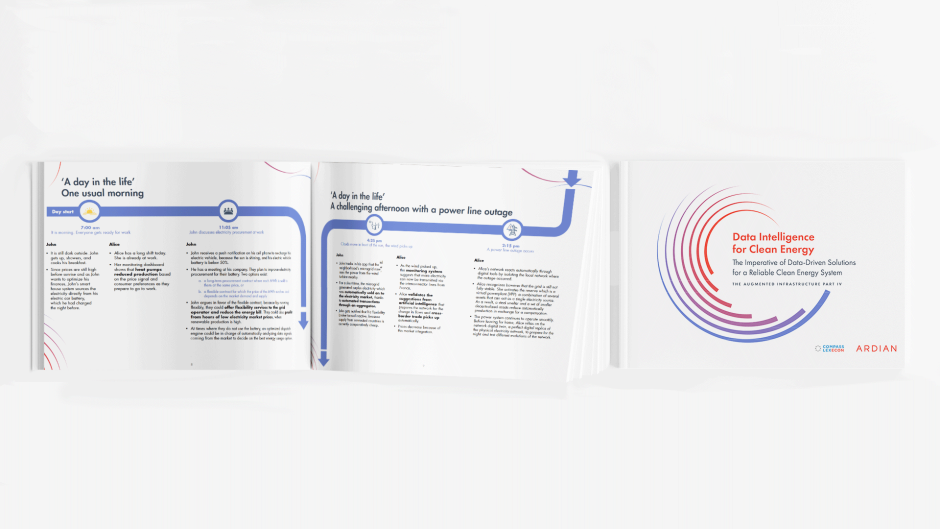Data intelligence is the cornerstone to a reliable and clean energy system
Market watch, Responsible finance
Data intelligence is the cornerstone to a reliable and clean energy system
-
03 April 2024
Reading time: 5 minutes
The energy sector is undergoing an unprecedented transformation. First, due to the shifts from traditional energy sources to cleaner and more decentralized alternatives. Second, as electrification spreads into new sectors including home heating, transport, and industrial production, around 60% of the EU energy system will have to be electrified by 2050, compared to just 23% today.
-
60%
of the EU's energy system aims to be electrified by 2050
-
23%
of this energy system is electrified today
-
22%
of today's electricity is generated from renewable sources
Within today’s 23% share that is electrified, less than a quarter of the power (22%) is generated from renewable sources. Therefore, the implications are clear: production of clean renewable energy – from wind, solar and hydro as well as hydrogen and biofuels – need to rise dramatically by the middle of the century to meet the goals of the Paris Agreement.
Publication of the “Data Intelligence for Clean Energy” Study
Publication of the “Data Intelligence for Clean Energy” Study
However, as the energy system becomes more geared towards renewable generation, it faces a range of challenges that must be overcome to deliver a secure, affordable, and environmentally sustainable energy. Ardian Infrastructure team believes that data sharing, data intelligence and, more broadly, digitalization, will be crucial in overcoming these challenges.
In November 2023, the Infrastructure team at Ardian, in partnership with the consultancy Compass Lexecon, provided a new perspective into the challenges and opportunities for digital solutions along the electricity value chain. The study – Data Intelligence for Clean Energy – is the fourth in the Augmented Infrastructure series that Ardian has published in recent years. Each year, through insights and concrete case studies, this publication highlights how digital technologies can be combined with physical assets to create intelligent and responsive infrastructure.
On November 7th, 2023, Ardian released the study at the occasion of its annual conference. Ardian and other industry experts explored and debated the crucial role of data intelligence in overcoming the challenges of decarbonizing Europe’s energy system.
Ardian Infrastructure team is a leading owner and operator of wind and solar generation capacity in Europe and North America.
Only by adopting a digital strategy and harnessing the potential of data can energy systems overcome the challenges between production, transmission, distribution, and consumption. Events such as COP28 are giving fresh impetus to discussions on the investments needed in clean energy. Digitization should be at the heart of these discussions.
Major challenges on the path to a clean energy system
Major challenges on the path to a clean energy system
Transitioning to a decarbonized energy system with significant input from renewables however comes with several challenges.
Wind and solar are dependent on weather and therefore suffer from intermittency, producing power only when the weather conditions allow. This creates peaks and troughs in electricity output that must be forecast and managed to ensure reliability of supply to the consumers.
Furthermore, during periods of favourable weather conditions, renewable assets can over-produce, generating so much electricity on the market that prices fall below zero. This problem, referred to as self-cannibalization, grows as more renewable assets come on the grid and are likely to make some investment cases for renewables projects less attractive. In Germany, the number of hours with negative power prices doubled year-on-year in the first half of 2023.
Switching from stable and predictable sources of energy to a more weather-dependent generation also calls for ways of making the system more flexible, so that demand can be met. This could mean the ability to connect different renewable assets to the grid depending on their output and the level of demand, or the ability to balance the grid by shifting part of the demand to off-peak times.
Electricity grids are moving from having a small number of large power producers to having millions of small-scale producers and micro-transactions. Efficient and effective coordination will become a major challenge.
But as the number of renewable energy assets increases, rising demand for network connections is likely to create bottlenecks and congestion on the grid.
In each of these areas, digitization and data intelligence will help to mitigate the challenges. Data analysis can allow more accurate forecasting of output from renewable assets, based on expected weather conditions, enabling better management of the assets to avoid over-production. Equally, digital solutions can enable better forecasting and real-time management of a more complex and decentralized energy system, so that output can be matched more closely with demand and network congestion can be anticipated, allowing grid capacity to be used more efficiently.
Ardian Infrastructure team is harnessing the power of data intelligence
Ardian Infrastructure team is harnessing the power of data intelligence
Ardian Infrastructure team is already exploiting the potential of data intelligence to manage its renewable portfolio. The team has built a proprietary software tool, Opta, to optimize operations as well as to better steer the energy and risk management of the renewable portfolio.
Ardian is convinced that no clean energy system can be reached without a major investment in data intelligence solutions and digitalization all along the value chain.
Beyond overcoming the challenges, data and digital solutions will also create new opportunities. By enabling innovative market designs, new products, and the granular matching of demand with local and clean energy generation, these technologies open new perspectives to achieve the fight against climate change.




